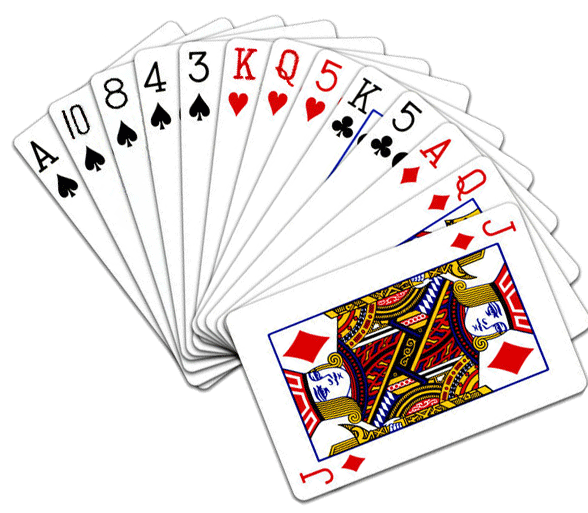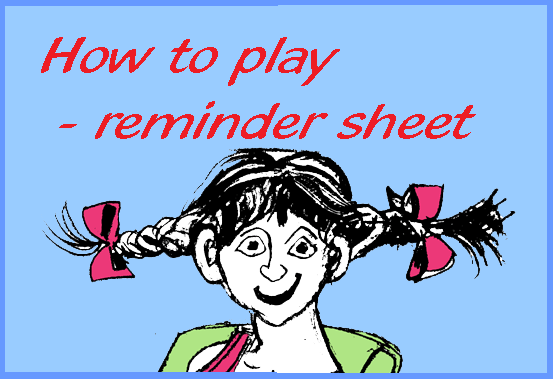
Solo is a game in the Whist family, played with a standard pack of cards by four players. A group that plays together regularly is called a ‘school’. According to Solopedia, it isn’t a form of whist at all, but derives from a game that was played in Flemish countries in the 19th century, which itself may have migrated from Spain.
It’s not a partnership game like basic whist. Rather, one player seeks to achieve the winning or losing of a specified number of tricks, and the other three are set against them – very solo. Most people play a certain number of hands – four’s too few: twelve’s not a bad game.
Of course, the opposition is not allowed in any way to confer or exchange information.
There’s one situation where it’s not a solo-situation: covered later.
Being a trick taking game (like whist), ranked and suited cards are used to win tricks. Ace is the highest ranking card in any suit, and players must always follow the suit that was led if they are able to.
There are trumps, and that varies from hand to hand.
Shuffling, dealing, and trumps.
Before the game begins the cards are shuffled, and cut once by the person to dealer’s right. They are generally not shuffled again, though some do after a bid of abundance has been played
So, after each hand has been played, the cards are simply collected up into a single deck, and then cut once by the player to right of the next dealer, who then goes on to deal. This means that there may be non-random distribution of the cards within the pack, which increases the chances that there will be viable bids (and viable opposition).
Dealing is not done card by card, but in small ‘clumps’. This varies between different ‘schools’, but the easiest way is probably to deal cards out in groups of three per player (four times round), and finish with a final card to each at the end. Don’t be pushed around by anybody who jumps up and down, claiming that it’s some kind of sacrilege to do otherwise.
To be fair about determining what suit is trumps you can use the cards of another deck rather than turning up the last card (which seems a little unfair on the person who’s card gets seen by all). Alternatively, you can simply always go in an agreed suit order, like Spades, Diamonds, Clubs, Hearts.
Remember, it’s a game: not a religion. So do what suits you best.
The bidding before play begins.

The dealer having dealt out thirteen cards to everyone, player on dealer’s left indicates whether they want to bid, or pass, and the bidding goes around the table. Each player is only allowed one bid, unless the player is raising their bid against one that came after their own: it’s not possible to bid after having passed (except to ‘cop’ – defined later).
If all pass, move straight on to the next hand.
Prop is the only bid where it’s not a solo situation. This is the weakest available bid. When someone calls ‘prop’ (or proposal) they are indicating that if another player joined them in partnership, the pair of them jointly would seek to win eight tricks, with trumps as showing. Having called ‘prop’, they must wait until others have their turn to bid before they can know if someone else is prepared to join them: by saying ‘cop‘ (no idea what that stands for).
All the bids listed below are more potent than, and will outbid prop & cop. If nobody comes forward to act as ‘cop’ to a ‘prop’ bid, the prop bidder is allowed to upgrade their bid – being now aware that none of the others sees themselves as strong enough to ‘cop’, they may reappraise their own hand.
Solo indicates that the player anticipates winning (on their own) five of the thirteen tricks, with trumps as shown. The other three players would be trying to stop this from happening.
Misère is a more potent bid. So if someone had bid solo, and another bids misère after them, it’s the latter bid that now stands proud. There are no trumps if misère is being played.
Misère is French for ‘extreme poverty’ or something like that.
Be careful: you may end up thus if you play solo for money! Speaking of which, my dad, in the days of steam trains, used to travel daily up to Euston, and played solo at a penny a point for a full 45 minutes each way. Fortunately, we never went without bread: butter, yes, but never bread.
Misère indicates that the player seeks to win none of the thirteen tricks: not one. If they do win a trick they’ve failed. The hand isn’t played to the end: there’s no point. Rather, start the next hand.
Abundance is the next most potent bid. If someone bids it after another has bid misère, then it’s the abundance that’s played. As the name suggests, it means winning a lot of tricks – nine in fact.
There will be a trump suit in abundance, but it’s not until after all the bidding has finished and play is about to begin that the person who called abundance states what trumps are: they have the choice.
If someone bid ‘abundance’, someone else can bid royal abundance, meaning that trumps will be the trump suit that is showing already. Their bid is more potent than simple abundance.
There’s no need to call ‘royal’ unless it’s as an overbid – abundance bidders keep trumps quiet until they have to declare them, so that no potentially damaging information leaks out too early.
Misère ouverte is a powerful bid! It’s exactly the same as a simple misère, except that after the first trick has been played, the player lays their cards down for all to see – their hand becomes open, or ouverte.
Abundance declared is the most potent bid: not often seen. It means that the player will win all thirteen tricks, not just five, or nine. There are no trumps.
It is the only bid where the person who starts play is not the one sitting to the dealer’s left. This time, it’s the abundance-declared caller who starts play.
Oh! Misery! Some play that if there has been no bid, then rather than the hand being annulled, misery is played. It simply means that the winner of the last trick scores as if they had lost a bid of solo.
So, how does the scoring go?
Oh, first, another point about play.
Unless you’re giving extra points for tricks won above the bid (as happens at BoardGameArena), there’s no need to play on once someone’s achieved their goal: just gather up all the cards and move on to the next hand.
One person acts as scorekeeper. All that’s needed is a scrap of paper with the four names at the head of four columns, keeping a note of the score of each hand, and a running total.
Hands can be scored as follows. There is slight variation between schools in the way it’s done, so if you’re playing with a different group of people, it’s useful to check out before play starts what bids are allowed, and what their scores are … so everybody’s clear and in agreement.
Prop & cop – if successful, partners get 2 points each – opponents lose 2 each
(it’s always the reverse if not successful – a failed prop & cop means the bidders each pays 2 points, and opposition each gets two points)
Solo – if successful, player gets 6 points: 2 from each opponent
Misère – if successful, player gets 9 points: 3 from each opponent
Abundance – if successful, player gets 12 points: 4 from each opponent
Misère ouverte – if successful, player gets 18 points: 6 from each opponent
Abundance declared – if successful, player gets 24 points: 8 from each opponent
So …. solo is …
- very replayable
- challenging, risk laden, and fun
- skill & strategy develop with practice
- certainly is combative – trick taking
- luck of the deal is involved
- has plenty of appeal for experienced card players
- plays well online

